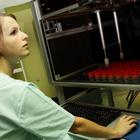 Heart valve for life
Heart valve for life
Poland's first device for automatic modification of the prosthetic heart valve surface was presented at the Foundation for Cardiac Surgery Development headquarters in Zabrze on September 1.
Thanks to modern technology, once implanted, the valve does not need to be replaced.
Heart valve replacement is a cardiac procedure used in the treatment of advanced valvular defects.
"Artificial
heart valves can be made of synthetic or biological material
(biografts). An important part of treatment is to minimize the
inflammatory response after valve implantation. One way to avoid
complications is to cover the valve surface with the patient’s cells" -
said Dr. Piotr Wilczek, head of the Bioengineering Laboratory of the
Foundation for Cardiac Surgery Development.
The device the size
of a desk, which was presented at the headquarters of Prof. Zbigniew
Religa Foundation for Cardiac Surgery Development, replaces the tedious
and repetitive work of a man, who would spend 6-7 hours on the
preparation of a prosthetic heart valve.
"Hospital employee, who
covers the valve with cell layers, must perform a series of repetitive
tasks. The device not only shortens the process, it does the doctor’s
work, because it applies individual layers itself" - explained Wilczek.
Presented
device does the manual work of man, is more accurate, can work without
interruption, since the computer controls the deposition of
polyelectrolytes (organic compounds) to facilitate the process of
covering heart valve prosthesis with cell layer.
Currently, heart
valve must be replaced on average every 15 years. It the first valve is
injected into a person under 40, it certainly will not be the last
procedure in the person’s life. The valve will be replaced, possibly
several times. With age, each successive treatment becomes increasingly
burdensome for the patient.
"Our goal is that, once implanted,
the valve is for life" - said Wilczek. In his view, the device is part
of the so-called regenerative medicine and tissue engineering, and its
application "will open the next stage of in vitro studies on the
development of new generation heart bioprostheses".
A year has
passed from idea to implementation. The machine costs PLN 25 thousand.
The Foundation does not exclude a larger scale production.
The
Foundation for Cardiac Surgery Development in Zabrze develops and
implements equipment and products for saving human life, when the heart
is at risk. It specialises in work related to the artificial heart,
cardiac surgery robot and innovative surgical tools, tissue engineering
and biological prosthetic heart valves to correct congenital and
acquired heart defects in children and adults.
The Foundation was
founded in 1991 by Prof. Zbigniew Religa, who as head of the Regional
Centre of Cardiology in Zabrze (now the Silesian Centre for Heart
Diseases) performed the first heart transplant in Poland.
PAP - Science and Scholarship in Poland
last modification: 2011-09-26













































 Heart valve for life
Heart valve for life